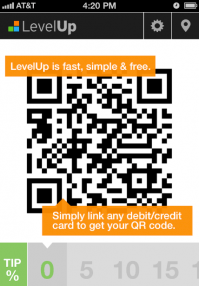Mobile payment service LevelUp, an off-shoot of Boston-based SCVNGR, announced this morning that it has raised $9 million from T-Venture, the venture capital arm of Deutsche Telekom. The investment is the second tranche of a larger funding round and brings the total raised to just over $21 million. SCVNGR itself has raised over $31 million. As a result of the investment, T-Venture Senior Manager Randeep Wilkhu will join the startup’s board as an observer.
As for some context: Every day there’s a new headline about mobile payments solutions. It seems that every carrier and credit card company has its own system, while all the big mobile players are working on one or have one already on the market (Google Wallet). The rumors indicate that the iPhone 5 will have NFC functionality to enable Apple’s entry into the mobile payments game. The point is: It’s easy to be skeptical of new solutions, especially when it comes to long-term viability.
Yet, in spite of the apparent saturation and the success of Square and others, no one solution has emerged as the outright leader. That’s why Seth Priebatsch launched LevelUp (as an off-shoot of SCVNGR) in beta last July, hoping to create an easy, carrier and card-agnostic payment and loyalty system that could be used everywhere.
Since then, the company has grown its U.S.-based staff to 162 and Priebatsch expects the team to grow to 200 by the end of the year. As of today, LevelUp users can pay with their mobile device of choice at 3,000 participating merchants, which include Ben & Jerry’s, Quizno’s and Johnny Rockets, and more than 200K users spend a total of $2 million per month using LevelUp. In turn, Priebatsch wants the service to be in 50 cities in the U.S. by the end of the year and said that they plan to announce some even bigger nationwide chains this fall.
So, while there’s plenty of speculation over which of the major mobile payments players will crack the mainstream first, whether it’s Google Wallet, Isis, Pay With Square, or PayPal, perhaps the biggest validation for the service comes from the fact that several of LevelUp’s backers are now investing in the startup on top of their own mobile payment solutions. T-Mobile lent infrastructure and hardware to LevelUp to help it get off the ground, the founders of Discover invested in the startup’s first tranche — and now Deutsche Telekom via T-Venture.
 Priebatsch said that he believes this is a result of the fact that the startup is religiously attempting to remove the major barriers that prevent people from paying at local merchants with their phones. For now, that means LevelUp relies on the QR code as its main payment mechanism, but down the road that will mean adopting NFC. “We’ll do whatever it takes to get LevelUp into the hands of the masses,” Priebatsch tells us, “and that starts with providing value to merchants so they actually want to consider adopting another mobile payment network.”
Priebatsch said that he believes this is a result of the fact that the startup is religiously attempting to remove the major barriers that prevent people from paying at local merchants with their phones. For now, that means LevelUp relies on the QR code as its main payment mechanism, but down the road that will mean adopting NFC. “We’ll do whatever it takes to get LevelUp into the hands of the masses,” Priebatsch tells us, “and that starts with providing value to merchants so they actually want to consider adopting another mobile payment network.”
To do this, the startup recently announced that it has lowered its merchant interchange rate (a.k.a. “the swipe fee”) to zero. Now, LevelUp merchants pay 35 percent to the startup each time a consumer redeems first-time and loyalty rewards, so, because the revenue from this charge matched the interchange fees, Priebatsch says, the company decided to just go ahead and cover those fees itself. Why not?
In turn, the team hopes that this will offer a better acquisition strategy, removing the friction for many merchants that would participate otherwise. With Square charging 2.75 percent and most others at 3 percent, LevelUp starts to look good in comparison.
Merchants still end up paying more to LevelUp as part of that 35 percent charge, but the founder thinks that it can make up the difference by offering merchants one single solution for customer acquisition, retention, and analytics — exchanging zero credit card fees for a share of that business it creates by way of its loyalty rewards campaigns.
There’s no reason that other companies with big mobile payments solutions (like Starbucks) couldn’t eliminate credit card processing fees, which would mean that LevelUp would have to compete with name brands — further tilting an already uphill battle. In the meantime, Priebatsch and the LevelUp team are pushing to scale the system in the U.S. (and internationally) as fast as possible, hoping to achieve enough penetration in the next year so that, when the cards fall, LevelUp will have a presence that will be hard to ignore.
